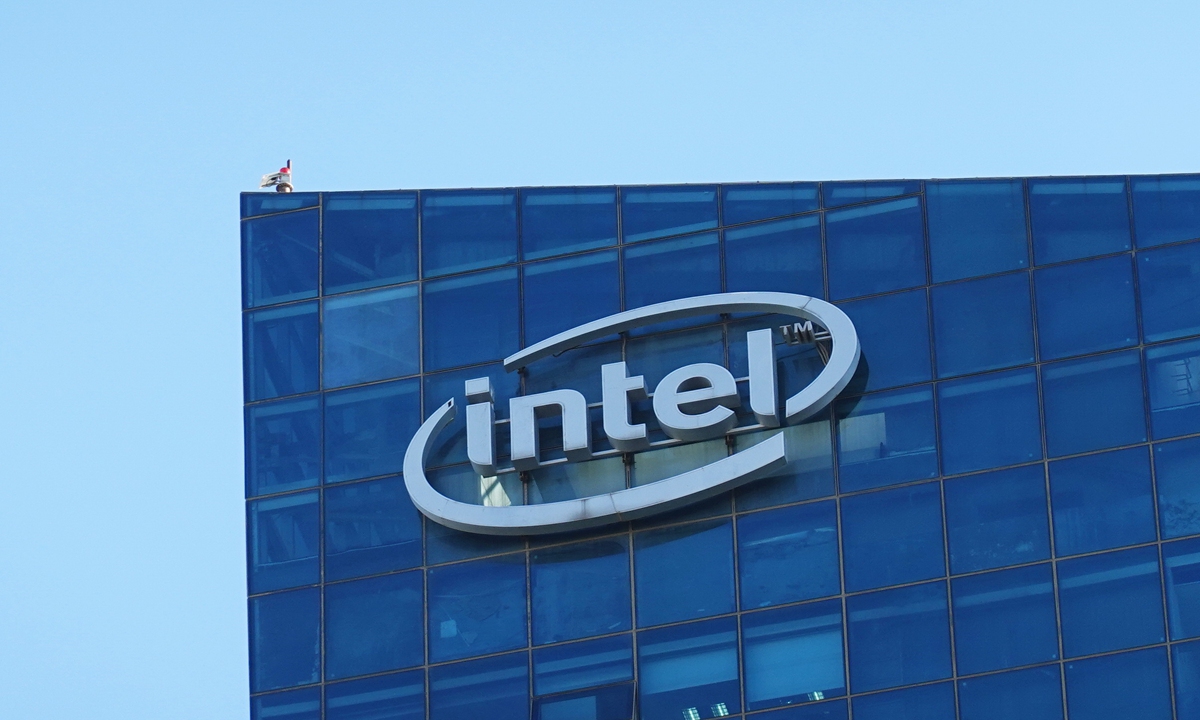
Intel Photo: VCG
The US government is reportedly to take another step to distort business operation. The White House confirmed on Tuesday that the Trump administration is working on a deal that could see the US government taking a 10 percent stake in chip giant Intel, BBC reported on Wednesday. A Chinese expert warned that the move may raise concerns among international consumers toward the company for suspicions of “backdoors” or additional regulatory requirements under the government’s participation.
US Commerce Secretary Howard Lutnick also confirmed discussions between the US and Intel Corp. for the government to take a stake in the chipmaker, casting the plan as a bid to convert Chips and Science Act grants into equity, Bloomberg reported.
According to the report, Lutnick on Tuesday said the plan would not give the US governance or voting rights in the company, even though it could make the federal government Intel’s largest shareholder. He was quoted as saying the chips law singed by previous US President giving semiconductor manufacturers subsidies without any return for US taxpayers.
“Direct equity investment by the US government in key industrial companies has been extremely rare in the past,” Xiang Ligang, a Chinese telecom industry expert, told the Global Times on Wednesday. “This reflects the urgency of the US government to use all available means to enhance the competitiveness of struggling chip companies.”
Xiang noted that concerns may arise among international clients that Intel’s products could be influenced by policy considerations, particularly in markets like China, where suspicions of "backdoors" or additional regulatory requirements could emerge. This would erode trust in Intel and negatively impact its foundry services and product sales.
"The fact that the US government is stepping in to save a blue-chip American company likely means that Intel's competitive position was much worse than what anybody feared," said David Wagner, head of equity and portfolio manager at Intel shareholder Aptus Capital Advisors, Reuters reported.
However, under the CHIPS Act, US Department of Commerce has proposed up to $8.5 billion in direct funding to advance Intel’s commercial semiconductor projects in Arizona, New Mexico, Ohio and Oregon. Intel also expects to benefit from a US Treasury Department Investment Tax Credit (ITC) of up to 25 percent on more than $100 billion in qualified investments and eligibility for federal loans up to $11 billion, according to the company’s official website.
“It also hints at the ineffectiveness of the US administration’s chip support policies,” Xiang said.
Xiang noted that the proposal to take a stake in Intel signifies a shift in US policy approach: from relying solely on fiscal subsidies to adopting equity-based involvement to deepen ties with companies, which is not merely about financial support but, more importantly, represents government intervention aimed at leveraging various resources to maintain its global technological hegemony.
Some media reports also mentioned China in the Intel’s case.
"The US government is taking a China card here and trying to have a little more control over some of the production that these companies are having," Reuters reported, citing Clark Geranen, chief market strategist at CalBay Investments.
Quoting Mira Ricardel, former undersecretary of commerce for industry and security in the first Trump administration, the Wall Street Journal said that such a stake could give the US government greater influence over and visibility into Intel’s operations, particularly regarding China, in ways that regulations or subsidies likely could not.
China's cyberspace regulator in July summoned US tech giant Nvidia over security risks concerning its H20 artificial intelligence (AI) chips sold to China in accordance with relevant laws. Nvidia was asked to provide explanations and submit relevant evidence to address security risks associated with vulnerabilities and potential backdoors in its H20 computing chips, which are designed specifically by the company for the Chinese market.
Lin Jian, spokesperson from China’s Foreign Ministry, said on August 12 that China has made clear its principled position more than once on the US export of chips to China. We hope the US will take concrete actions to keep the global industrial and supply chains stable and unimpeded.
Xiang noted that the US is transitioning from an "era of confidence" to an "era marked by uncertainty and a defensive mindset." However, the goal of reshoring the high-end manufacturing through political intervention is unlikely to succeed, as the supply chain is highly complex and the US lacks sufficient talent reserves and supporting ecosystems, with costs significantly higher than those in Asia.
阅读原文:https://www.globaltimes.cn/page/202508/1341301.shtml